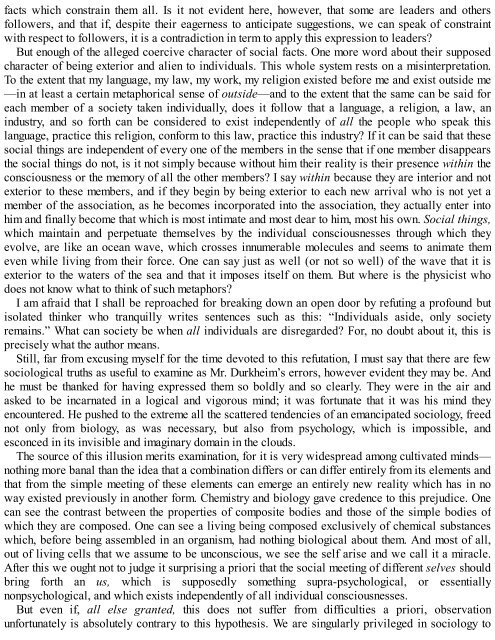3658925934
Create successful ePaper yourself
Turn your PDF publications into a flip-book with our unique Google optimized e-Paper software.
facts which constrain them all. Is it not evident here, however, that some are leaders and others<br />
followers, and that if, despite their eagerness to anticipate suggestions, we can speak of constraint<br />
with respect to followers, it is a contradiction in term to apply this expression to leaders?<br />
But enough of the alleged coercive character of social facts. One more word about their supposed<br />
character of being exterior and alien to individuals. This whole system rests on a misinterpretation.<br />
To the extent that my language, my law, my work, my religion existed before me and exist outside me<br />
—in at least a certain metaphorical sense of outside—and to the extent that the same can be said for<br />
each member of a society taken individually, does it follow that a language, a religion, a law, an<br />
industry, and so forth can be considered to exist independently of all the people who speak this<br />
language, practice this religion, conform to this law, practice this industry? If it can be said that these<br />
social things are independent of every one of the members in the sense that if one member disappears<br />
the social things do not, is it not simply because without him their reality is their presence within the<br />
consciousness or the memory of all the other members? I say within because they are interior and not<br />
exterior to these members, and if they begin by being exterior to each new arrival who is not yet a<br />
member of the association, as he becomes incorporated into the association, they actually enter into<br />
him and finally become that which is most intimate and most dear to him, most his own. Social things,<br />
which maintain and perpetuate themselves by the individual consciousnesses through which they<br />
evolve, are like an ocean wave, which crosses innumerable molecules and seems to animate them<br />
even while living from their force. One can say just as well (or not so well) of the wave that it is<br />
exterior to the waters of the sea and that it imposes itself on them. But where is the physicist who<br />
does not know what to think of such metaphors?<br />
I am afraid that I shall be reproached for breaking down an open door by refuting a profound but<br />
isolated thinker who tranquilly writes sentences such as this: “Individuals aside, only society<br />
remains.” What can society be when all individuals are disregarded? For, no doubt about it, this is<br />
precisely what the author means.<br />
Still, far from excusing myself for the time devoted to this refutation, I must say that there are few<br />
sociological truths as useful to examine as Mr. Durkheim’s errors, however evident they may be. And<br />
he must be thanked for having expressed them so boldly and so clearly. They were in the air and<br />
asked to be incarnated in a logical and vigorous mind; it was fortunate that it was his mind they<br />
encountered. He pushed to the extreme all the scattered tendencies of an emancipated sociology, freed<br />
not only from biology, as was necessary, but also from psychology, which is impossible, and<br />
esconced in its invisible and imaginary domain in the clouds.<br />
The source of this illusion merits examination, for it is very widespread among cultivated minds—<br />
nothing more banal than the idea that a combination differs or can differ entirely from its elements and<br />
that from the simple meeting of these elements can emerge an entirely new reality which has in no<br />
way existed previously in another form. Chemistry and biology gave credence to this prejudice. One<br />
can see the contrast between the properties of composite bodies and those of the simple bodies of<br />
which they are composed. One can see a living being composed exclusively of chemical substances<br />
which, before being assembled in an organism, had nothing biological about them. And most of all,<br />
out of living cells that we assume to be unconscious, we see the self arise and we call it a miracle.<br />
After this we ought not to judge it surprising a priori that the social meeting of different selves should<br />
bring forth an us, which is supposedly something supra-psychological, or essentially<br />
nonpsychological, and which exists independently of all individual consciousnesses.<br />
But even if, all else granted, this does not suffer from difficulties a priori, observation<br />
unfortunately is absolutely contrary to this hypothesis. We are singularly privileged in sociology to









![Genki - An Integrated Course in Elementary Japanese II [Second Edition] (2011), WITH PDF BOOKMARKS!](https://img.yumpu.com/58322134/1/180x260/genki-an-integrated-course-in-elementary-japanese-ii-second-edition-2011-with-pdf-bookmarks.jpg?quality=85)
![Genki - An Integrated Course in Elementary Japanese I [Second Edition] (2011), WITH PDF BOOKMARKS!](https://img.yumpu.com/58322120/1/182x260/genki-an-integrated-course-in-elementary-japanese-i-second-edition-2011-with-pdf-bookmarks.jpg?quality=85)





